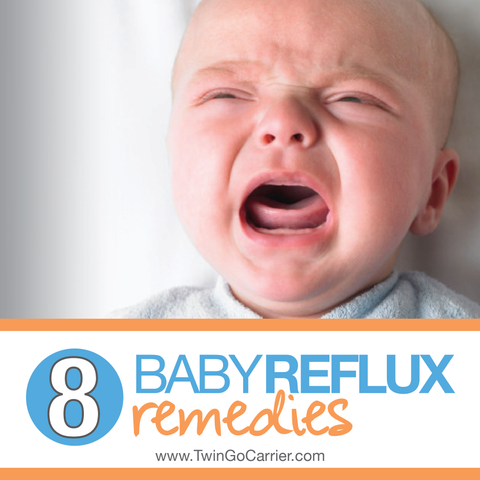What is baby reflux?

Having twins as my first children helped me notice differences between them rather than wonder if I was doing something wrong. Although my twins were premature, my daughter generally fed well and was happy but almost from the beginning, I could tell my son wasn’t comfortable and the fussiness was seemingly unstoppable around feedings. Instead of thinking I was failing at breastfeeding, I was sent on a learning journey to find him relief. I talked to experienced mothers and read a lot about my son’s behaviors, and immediately I suspected baby reflux.
What causes acid reflux in infants?
Most full-term newborns—and essentially premature twins—have some degree of reflux in the early months due to an undeveloped lower esophagus sphincter. The weak sphincter muscle that separates the esophagus from the stomach opens regularly, allowing stomach acid to reverse flow back into the throat causing burning and pain. Some little tikes can struggle with bowel movement and gas due to the underdeveloped vagus nerve function. Symptoms of acid reflux are further exacerbated when we lay our babies on their back for sleep or play.
What are symptoms?
Below are some common symptoms of baby reflux. For some children, their reflux will be more severe or they may be more sensitive to the effects. Check the list and talk to your pediatrician if your child has any of these persistent symptoms:
- Refusing the breast/bottle, gulping with a painful look on the face, bursts of crying during feeding
- Arching back/neck during or after feeding
- Demands to be held constantly, resistance to laying on back
- Painful wake-ups from sleep or poor sleeping habits
- Gassy and/or foamy bowel movements
- Spitting up, usually projectile through mouth or nose (*not with silent reflux)
- Blood in the stool or spit up
- Excessive crying and seemingly uncomfortable in body, particularly after feeding
- Wheezing, apena or breathing difficulties (respiratory infections)
- Slow weight gain or losing weight
- Coughing regularly
- Sour breath, hiccups, wet sounding burps
- Red or salmon colored throat
How is baby reflux diagnosed?
There are two forms of baby reflux: acid reflux and silent acid reflux. While acid reflux in infants usually results in regular projectile vomiting and intense crying, silent reflux is when acid burns on the way up and down the throat again. Sour breath, hiccups, and excessive crying are more typical symptoms. Most pediatricians will diagnose baby reflux based on persistent symptoms. If natural remedies or common medication doesn’t help, then some pediatricians may suggest further, more invasive, testing:
- Ultrasound to check the upper GI tract for obstructions or abnormalities.
- Blood tests to see if the feeding issues stem from something else like infection or anemia.
- Barium swallow or upper GI test to highlight any obstructions or abnormalities in an X-Ray.
- Upper GI endoscopy to look directly inside the upper GI tract and detect any issues.
- pH probeto measures the stomach acid levels and determines if there are any breathing problems as well.
Don't stop here...Check out this article on 8 Remedies for Baby Reflux!



